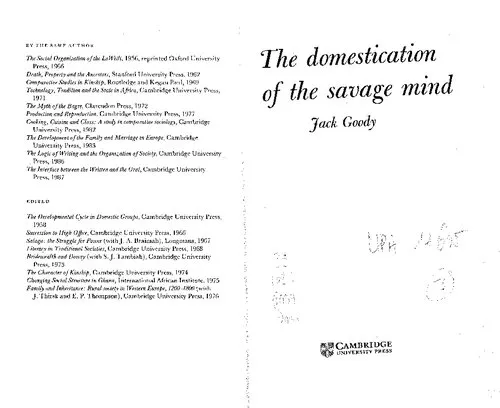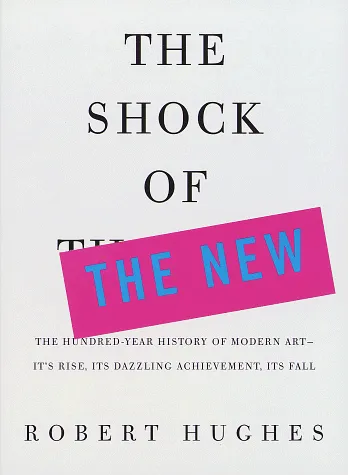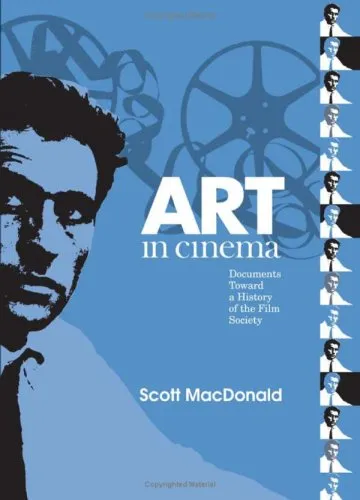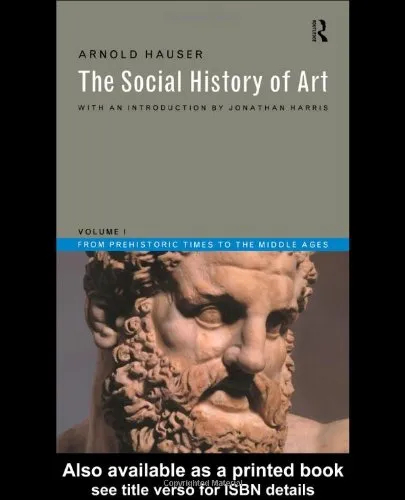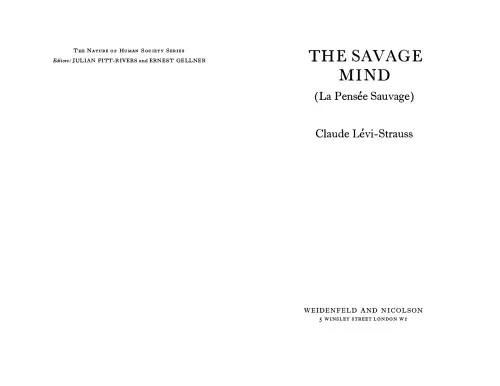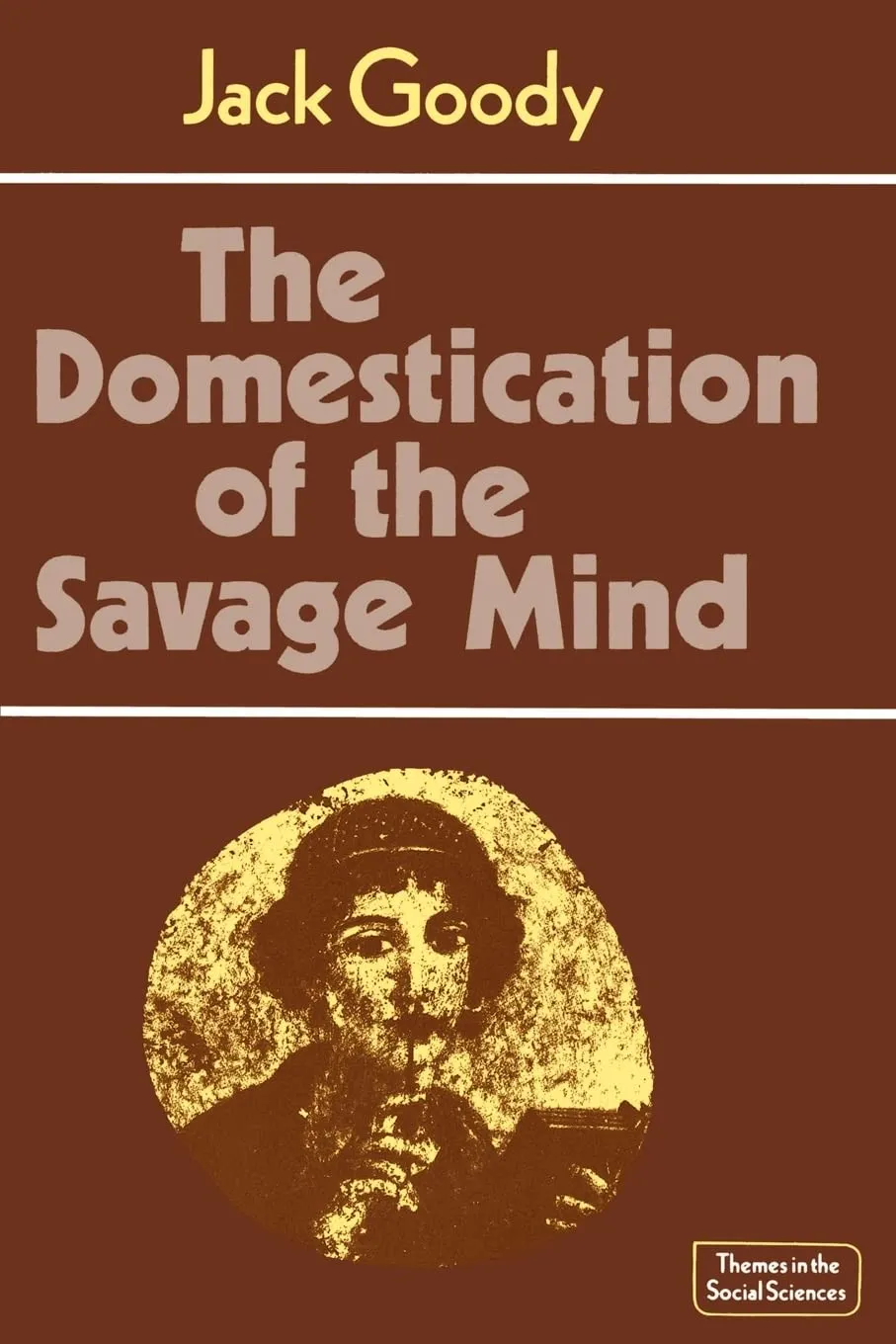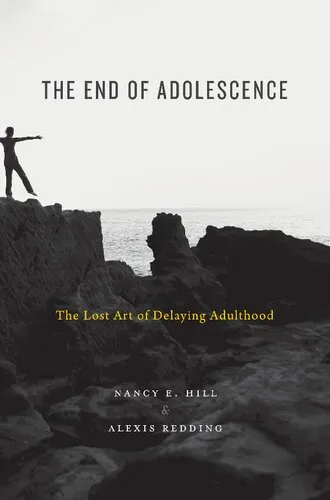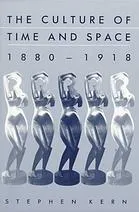The Domestication of the Savage Mind
4.0
بر اساس نظر کاربران

شما میتونید سوالاتتون در باره کتاب رو از هوش مصنوعیش بعد از ورود بپرسید
هر دانلود یا پرسش از هوش مصنوعی 2 امتیاز لازم دارد، برای بدست آوردن امتیاز رایگان، به صفحه ی راهنمای امتیازات سر بزنید و یک سری کار ارزشمند انجام بدینکتاب های مرتبط:
معرفی کتاب
کتاب «The Domestication of the Savage Mind» نوشته جک گودی، یک تحلیل جامعهشناختی و انسانشناختی از تفاوتهای فرهنگی و تأثیرات سواد و نوشتار بر جوامع انسانی است. گودی با تمرکز بر تغییرات شناختی و اجتماعی که از طریق نوشتار و توسعه زبان نوشتاری به وجود آمدهاند، به بررسی عمیق از فرهنگها و پیشرفتهای اجتماعی میپردازد.
خلاصهای از کتاب
در این کتاب، جک گودی به بررسی تحولاتی میپردازد که در ذهن انسان و رفتارهای اجتماعی او با ورود سواد و نوشتار رخ دادهاند. او به بررسی تفاوت بین جوامع دارای سواد و جوامع شفاهی میپردازد و توضیح میدهد که چگونه این تفاوتها به تغییرات شناختی و اجتماعی منجر شدهاند. گودی استدلال میکند که توانایی نوشتن و خواندن نه تنها ابزارهای جدیدی برای ذخیرهسازی اطلاعات ایجاد کرده، بلکه تفکر و استدلال انسانها را نیز عمیقا تحت تأثیر قرار داده است.
نکات کلیدی
- تأثیرات نوشتار بر تفکر و استدلال انسان.
- تفاوتهای بنیادی بین جوامع شفاهی و مکتوب.
- ارتباط بین سواد، دانش و قدرت.
- نحوه شکلگیری و تحول هنجارهای فرهنگی از طریق نوشتار.
نقلقولهای معروف از کتاب
«سواد، نه تنها برای ذخیرهسازی اطلاعات بلکه برای ساخت و پردازش اطلاعات به شیوهای پیچیدهتر استفاده میشود.»
«جوامع شفاهی و نوشتاری به طرق مختلف دانش و قدرت را تجزیه و تحلیل و اعمال میکنند.»
اهمیت کتاب
کتاب «The Domestication of the Savage Mind» نه تنها به دلیل محتوا و تحلیلهای دقیق خود ارزشمند است، بلکه به عنوان منبعی غنی برای دانشجویان انسانشناسی و جامعهشناسی نیز کاربرد دارد. این کتاب به خوانندگان کمک میکند تا درک عمیقتری از تأثیرات سواد و نوشتار بر جوامع پیدا کنند و به بررسی چگونگی تغییرات فرهنگی و شناختی با توجه به ظهور این فناوریها بپردازند. در جهان امروز که سواد و فناوری جزئی جداییناپذیر از زندگی انسانها شدهاند، این کتاب میتواند راهنمایی برای فهم بهتر از تاریخچه و تحولات اجتماعی این امور باشد.
Introduction
Welcome to a deep dive into the intricate exploration of cognitive processes, cultural diversity, and the evolution of human thinking with Jack Goody’s renowned work, The Domestication of the Savage Mind. This book offers readers a profound examination of how Western literacy has shaped and continues to influence methodologies of thought across different cultures. Utilizing anthropological insights and historical analysis, Goody challenges conventional understandings of 'primitive' and 'civilized' thought, urging readers to rethink assumptions and acknowledge the complexity inherent in cultural knowledge systems.
Detailed Summary of the Book
Jack Goody explores the powerful impact of literacy on human societies, arguing that the development of writing systems radically transformed mental processes. Through a comparative analysis of oral and literate societies, the book delves into how writing restructures thought by allowing information to be stored, scrutinized, and communicated with precision across generations. Goody traces the intellectual history back to ancient societies, indicating that the advent of writing catalyzed philosophical and scientific inquiries previously unattainable in purely oral cultures. He challenges the notion that there exists a fundamental cognitive chasm between 'primitive' and 'modern' minds by demonstrating that changes in information storage tools, rather than innate mental capabilities, drive differences in cognitive practices.
Key Takeaways
- Literacy fundamentally transforms cultural and cognitive patterns by allowing for the systematic storage and analysis of information.
- There is no inherent cognitive inferior-superior binary between oral and literate cultures; differences arise from technological advancements such as writing.
- The comparative study of societies can illuminate how diverse cultural practices shape cognitive processes distinctively and innovatively.
Famous Quotes from the Book
"The domestication of the mind is not about taming a savage beast, but rather about the cultivation and nurturing of complex, rich, and varied intellectual landscapes across cultures."
"Writing does not make us more intellectual; rather, it extends our capacity to engage with complex thoughts that oral traditions may not preserve."
Why This Book Matters
Jack Goody’s work stands as a seminal analysis in the anthropology of knowledge, offering a critical perspective on the importance of literate practices in shaping cognitive development. Goody disrupts the dominant narrative that literacy inherently elevates intelligence, presenting a nuanced view that considers historical and intercultural contexts. This book is particularly significant for students of anthropology, history, and cultural studies, and anyone interested in understanding how diverse communication forms have shaped human cognition throughout history. The insights provided prompt a reevaluation of modern assumptions about intellect, sophistication, and the valued modes of knowledge transfer, allowing for a more comprehensive appreciation of the cultural achievability of oral traditions as well.
دانلود رایگان مستقیم
شما میتونید سوالاتتون در باره کتاب رو از هوش مصنوعیش بعد از ورود بپرسید
دسترسی به کتابها از طریق پلتفرمهای قانونی و کتابخانههای عمومی نه تنها از حقوق نویسندگان و ناشران حمایت میکند، بلکه به پایداری فرهنگ کتابخوانی نیز کمک میرساند. پیش از دانلود، لحظهای به بررسی این گزینهها فکر کنید.
این کتاب رو در پلتفرم های دیگه ببینید
WorldCat به شما کمک میکنه تا کتاب ها رو در کتابخانه های سراسر دنیا پیدا کنید
امتیازها، نظرات تخصصی و صحبت ها درباره کتاب را در Goodreads ببینید
کتابهای کمیاب یا دست دوم را در AbeBooks پیدا کنید و بخرید
1375
بازدید4.0
امتیاز0
نظر98%
رضایتنظرات:
4.0
بر اساس 0 نظر کاربران
Questions & Answers
Ask questions about this book or help others by answering
No questions yet. Be the first to ask!
